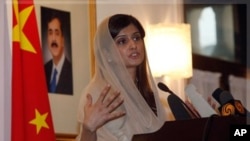Pakistan's foreign minister is denying claims made by some Chinese officials that her country had anything to do with terrorist attacks late last month in Xinjiang, in China's far west.
At the end of July, two bombs exploded in the streets of Kashgar, in China's far-western Xinjiang region. The blasts were followed by deadly mayhem. The violence left at least 19 people dead, including five attackers, and injured more than 40 others.
At the time, the Kashgar government issued a statement saying the terrorist ringleader received training from a Pakistan-based camp of the East Turkestan Islamic Movement (ETIM), a banned organization that seeks independence for Xinjiang.
Pakistani Foreign Minister Hina Rabbani Khar, who is visiting China, said officials clarified to her that Beijing is not accusing her country of being behind the Xinjiang terrorist attacks.
"The statement, vis-à-vis Pakistan's involvement of any sort, was misconstrued, was not from the Chinese government," said Khar.
At the same time, she said Pakistan has worked with China regarding the East Turkestan Islamic Movement (ETIM) and is ready to do more.
"If you are saying, 'Does it [ETIM] have any base in Pakistan?' We do not know. And if there is any such issue, as far as this particular group is concerned, then as I have said clearly, we would like to cooperate further to ensure - and we have already cooperated on this particular group within Pakistan," added Khar.
The East Turkestan Islamic Movement is made up of ethnic Uighurs, a Chinese minority group that calls Xinjiang its homeland.
Barnard College Political Science Professor Alexander Cooley said he thinks any ETIM presence in Pakistan is not likely to be a top priority for Pakistani authorities.
"My sense is you do not have the same kind of ties between the Pakistani military and the intelligence services, with the Uighur groups, that you do with some of the other Islamic groups, where they [Pakistan] maintain connections," noted Cooley.
This is Khar's first trip to China since taking office in July. She described the Pakistan-China relationship as going "beyond any two governments." She said the friendship has withstood the pressures of time, and especially has adapted to the changing global and regional environment.
She represents two firsts; the first woman to be Pakistan's foreign minister, and, at 33 years old, the youngest.
She met Wednesday with Chinese Premier Wen Jiabao and Foreign Minister Yang Jiechi.
This year is the 60th anniversary of diplomatic ties between China and Pakistan. The Chinese foreign minister hailed the two countries' relationship as a "high-quality strategic cooperative partnership" and an all-weather friendship.





